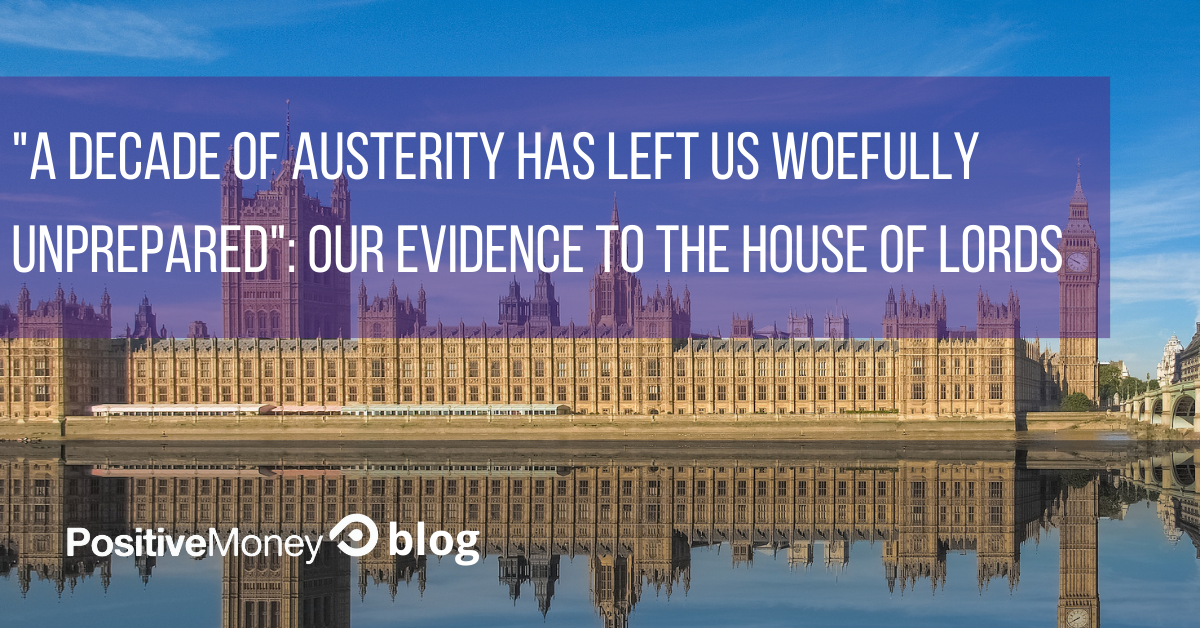
EUUK
3 July 2025
February 8, 2024
Giving evidence to the House of Lords’ Economic Affairs Committee, Positive Money’s Head of Economics Danisha Kazi told members that we need a more sophisticated approach to managing the public finances, to respond to long-term challenges.
This week, we were delighted to be invited to give evidence to the House of Lords’ Economic Affairs Committee, as part of their inquiry on the sustainability of the UK’s national debt. The group is a permanent committee charged with investigating economic affairs, having previously examined topics including central bank digital currencies, the housing market, and quantitative easing.
Government debt is a key part of the public finances that has received a lot of media coverage recently – often shrouded in negative, alarmist narratives – which can be difficult to decipher. When the government borrows to fund spending, they sell bonds, often referred to as ‘gilts’, to financial markets – they are sold first to banks, and the majority end up being bought by financial institutions like pension funds and insurance companies. Through quantitative easing, the Bank of England also purchased government debt, which it is now selling back into the market. Issuing gilts is of course not the only way that the government finances its spending – the government gets revenue from taxes, and as was shown in the early days of Covid-19 crisis, the government can also be financed directly from the Bank of England.
Governments set targets, termed ‘fiscal rules’, for overall public debt levels, which attempt to bind how much borrowing the government can take on. The idea is that the rules will limit excessive borrowing in the short-term, to ensure that the government won’t have a problem selling gilts to financial markets when they need to. The UK’s current fiscal rules require debt to be falling as a share of GDP by the end of a 5 year period, with annual additional borrowing not exceeding 3% of GDP by the fifth year.

The Lords’ inquiry was looking to investigate whether the UK’s national debt is on a sustainable path, what we’d need to do about it if not, and whether the Government’s fiscal rules around the national debt are appropriate. The UK’s public sector net debt, often referred to as the ‘national debt’, currently stands at just under 100 % of GDP.
The national debt and our ‘fiscal rules’ can seem like a complex topic. But how we structure and manage the public finances is hugely important for creating a fairer and more sustainable economy. The committee’s questions covered a wide range of topics, from what a ‘sustainable’ national debt is, to the impact of demographic ageing and meeting net zero targets, and whether the government’s fiscal rules are fit for purpose.
Here are five key points Positive Money made to the committee, arguing for a more sophisticated approach to our public finances that allows us to respond to the major challenges we face today of economic inequality and climate change.
1. Rising private debt is much more worrying than rising public sector debt
The committee opened by asking how worried the panel are about the public finances. But we pointed out that you can’t consider the public finances (and public debt) by looking at the public sector in isolation. As we pointed out, it was “explosive levels of private sector debt, along with financial deregulation, that led to the global financial crisis, that was the start of increasing public sector debt”. Wrongly treating the public finances like a household budget whilst ignoring the build up of risky private debt leads to the costs being borne by the public sector down the line.
2. Sustainability of the public debt is an ambiguous and political concept
The commonly used metric of the ratio of debt to GDP, is not particularly helpful in telling us whether or not public debt is sustainable. This is because it doesn’t tell us about the structure of our debt, which, as Danisha told the committee, is much more important than the overall level of debt. Overall public debt has been much larger in the past – in 1946, for instance, UK public debt reached over 250 % of GDP when setting up the post-war welfare state. Fears about high levels of public debt scaring off investors have been repeatedly debunked, and more broadly, the UK has the tools to finance itself through the Bank of England should it need to. More widely, politicians regularly change their fiscal targets, and their accounting to meet those rules, meaning that they aren’t even working on their own terms.
3. Our short-term fiscal rules are not fit for long-term challenges like climate change
Austerity and short-termism are baked into our fiscal rules. By policymakers focusing on the narrow goal of getting debt to fall as a share of GDP over a relatively short period, rather than on how the public finances can be managed to allow us to respond to huge challenges like the climate crisis, inequality and demographic ageing, all of which require investment at scale, we’ve seen a decade of austerity on a rationale of ‘fiscal responsibility’. As Danisha pointed out, this has “left us woefully unprepared” for future shocks – which are only more likely to arise as the impacts of climate change intensify.
Tackling climate change requires a huge amount of investment to transition major sectors of our economy away from harmful fossil fuels, and public investment has a big part to play in this. If we don’t invest now, the impacts of climate change will be much more costly in the long run – to the public finances, but more importantly to society and the environment. We need a better framework that allows us to respond to these challenges in a way that is fair and equitable, and allows us to enjoy the co-benefits that come with climate action – like cleaner air, better public services and lower bills – rather than kicking the can down the road.
4. We need a fairer tax system
Whilst taxes are not the only way the government finances itself, sustainable public finances has to mean making our tax system fairer. This means looking seriously at how we tax wealth and unearned windfall profits.
5. Using better tools to respond to inflation in a way that is fairer and more sustainable
Recent inflation has caused concerns about the rising costs of servicing the UK’s national debt, particularly in comparison to other G7 countries. Higher inflation has meant these debt instruments have become more expensive for the Government. Positive Money and others have highlighted that the narrow approach of aggressive interest rate hikes to tame inflation was an ineffective and blunt tool against recent inflationary pressures, which are rooted in external forces including geopolitics and climate change, which have caused volatile energy and food prices and supply chain disruptions.
Higher interest rates in response to inflation have also led to large unearned profits for banks. This is because the Bank of England pays interest on the reserves that commercial banks hold with it. These costs are backstopped by the Treasury, this has led to large payments from the Treasury to the Bank of England that have ended up in the hands of the UK’s banking sector.
Positive Money has been highlighting the need for better coordination between our key economic institutions – the Treasury and the Bank of England. Better coordination could allow us to respond to inflation in an equitable way, manage the structure and costs of the public debt in a way that supports greater public investment, and help to channel private investment towards the industries we need.
It was a brilliant opportunity to give evidence to members of the House of Lords. It’s promising to see decision makers engaging with civil society on this critical topic, which speaks to a growing recognition that we need a new approach to economic policymaking.
Sign-up to our mailing list or follow us on X (formerly known as Twitter) for regular updates, and donate to support our work fighting for a money and banking system that enables a fair, sustainable and democratic economy.
